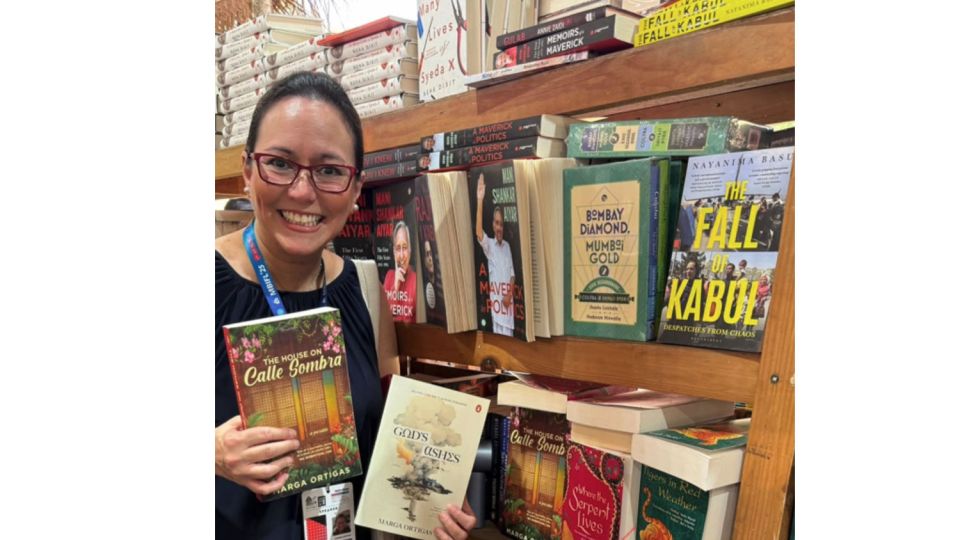April 15, 2025
MANILA – Some people are born storytellers—be it through the spoken or written word. While most excel in one medium over the other, some are brilliant at both.
One of those gifted few who can wield words with ease and grace is Marga Ortigas. Born and raised in the Philippines, Marga boasts over three decades of experience in journalism, notably as a reporter for two of the largest international news organisations: CNN and Al Jazeera. She has made her mark covering difficult stories, giving voice to the most vulnerable communities, across the world. She has also interviewed world leaders and influencers in various fields, across Asia, Europe, the Americas, and the Middle East.
In 2021, she pivoted from reportage to creative writing, with her debut novel The House on Calle Sombra. It was followed by her first collection of essays, There are No Falling Stars in China in 2023, and her second novel God’s Ashes the year after. Just last March, Marga saw the release of her second anthology of essays, WTF?! Woman Turning Fifty, which she describes as a collection of observations on getting older, and an exercise in accepting—or raging against—mortality. All her works have been published by Penguin Random House Southeast Asia.
In an interview with Asia News Network, Marga shares her journey from “fiction to fact and back to fiction again,” some life lessons, tips for aspiring writers, and a peek into her favorite reads.
A lifelong storyteller
Marga tells ANN that she has been telling stories for as long as she can remember. One of her earliest memories of writing is when, at seven or eight years old, she made up stories about a detective. She shared with us a link to her short Youtube profile video which included little Marga reading aloud a story.

Young Marga Ortigas. SCREENSHOT FROM MARGA ORTIGAS’ YOUTUBE PAGE
At a very young age, Marga, whose mom was a high school English teacher in an all-girls school in Manila, was already a prolific writer. Essays, short stories, even poetry, name it, Marga has tried writing them all. With her profound love of words and stories, it seemed only natural for her to chart a course in media, which she did, starting off with radio before moving on to her dream job: reporting for television.
“I went from fiction to facts,” she narrates in her video. “And after three decades, it’s back to fiction.”
“The vitalness of being present”
Marga’s many years on the field—across places ravaged by disasters both natural and man-made—has taught her so much about life, writing included.
Writing for television news, for instance, which requires brevity and clarity, as well as succinctness and purposefulness of each word, has profoundly influenced her prose. “As you are writing about real life, it makes you pay attention to your surroundings. Impresses upon you the vitalness of being present,” the Ateneo de Manila University and University of Greenwich alumna says.

Marga Ortigas interviewing fighters who broke away from a rebel group in the Philippines’ Mindanao province in 2011. PHOTO: MARGA ORTIGAS’ WEBSITE
“But beyond that, my news background and the writing it entailed have also informed the way I move through the world,” she shares. “I have learned that no matter how strictly you plan for something or how much you think you’ve prepared, life has its own movements, and you will have to pivot and float and adapt or risk being subsumed by the tides.”
Marga’s many travels have also influenced how she writes. “…I have tried to make it a point to always be present where I am, anything I see or witness becomes part of the fabric of who I am,” she tells ANN. “And it is always from this that I pull things when I write.”
“As you are writing about real life, it makes you pay attention to your surroundings. Impresses upon you the vitalness of being present.”
She clarifies that she doesn’t make it a point to write about specific topics such as global warming, illegal migration, or armed conflict, for example. But as these are part of her experiences and that of the world at large, “so it naturally comes out in my writing. Basically, putting things into words and exploring narrative lines… help me make sense of the world.”
“When humanity is at its worst… you can also find its best”

Marga Ortigas reporting from Rafah, Gaza in 2015. PHOTO: MARGA ORTIGAS’ WEBSITE
Asked what her most memorable assignment was, Marga answers that Iraq and Gaza are right up there. “Areas in the throes of conflict. Emotions are raw, and everything is heightened,” she explains. “Times like that can’t help but leave indelible marks. But it is when humanity is at its worst, that you can also find its best.”
“This is also evident in the aftermath of natural calamities like the great quake in Japan in 2011 and Super Typhoon Haiyan in the Philippines in 2013,” she continues. “Meeting survivors of such incredible unimaginable tragedies will change you.”
On writing facts versus writing fiction
Marga, who was a British Council Chevening scholar, shares that as a young reporter, she saw how much of an adventure it was to go out into the world and “explore, explore, explore!”
“I always had a journal with me that I would fill with whatever came to mind when I was moving through the locale I found myself in,” she recalls. “It gave me space to reflect and capture my emotions—even if I couldn’t make sense of them at the time.”
“And I was always writing for me and me alone, so I wasn’t worried about an editor or a reader,” she stresses. “It allowed me to just flow. Without censoring myself. And that was enough.”

Marga Ortigas reporting from the Philippine province of Pampanga in the aftermath of Typhoon Parma in 2009. PHOTO: MARGA ORTIGAS’ WEBSITE
The older she got, however, the less energy she had to get out and climb a mountain or go down into a cave or sleep in a tent during a storm. “I found I was tired of all the noise and the mess of humanity. I was also tired of being talked at,” Marga admits.
“I needed more time for silence… and peace … and breath. And it was when I took that pause that the written word could resurface. I had always wanted to write a book, and I suppose when I was old enough to think I could dare try—I did.”
“It takes a lot to commit to the words you string together to encapsulate a thought. But there is such a sense of joy and relief once you’ve done so.”
Marga likens newswriting to taking threads already in existence and weaving them together to craft tapestry, adding that it’s to create something that makes sense. “With creative writing, there is only you—and the blank page,” she explains. “You can put down anything you want, in whatever way you want.”
In a sense in creative writing, there is more freedom, Marga enthuses, but also infinitely more fear. “Each writer will have their own reasons for creating or producing as they do – but in every page, their vulnerability is exposed.”
Writing influences
It’s almost always a given that writers are also readers. Marga admits its tough zeroing in on the writers who have influenced her writing—unsurprising for a voracious reader. She mentions Jane Austen, whom Marga says “understood the nuances of subtle social dynamics” and is “eternally brilliant.”
“Austen’s prose is so vibrant it dances,” she exclaims.
“Then, there is Thomas Hardy. I don’t know how people will take this, but for me, he writes with the empathy and sensitivity of a woman. I mean that as the highest compliment,” Marga says. She describes Hardy’s lyrical texts as having a melancholic rhythm that moves readers along almost powerlessly.
“You can’t help but be swept up in the poetry of his words. There is so much pain and sorrow mixed in with the heartbreaking beauty,” she says, adding how Hardy’s Tess of the D’Urbervilles “gripped” her chest. “I will never forget how that book made me feel. I shivered and gasped aloud. I had such a visceral reaction to it.”

Marga Ortigas conducting interviews in Karada, Iraq in 2003. PHOTO: MARGA ORTIGAS’ WEBSITE
Another book that Marga had a gut reaction to is Olive Schreiner’s Story of An African Farm. “It was of its time, and it questioned the status quo. Gender and social norms, the realities and impositions of colonialism and religion,” she says of the book. “I suppose I like work that questions the world and opens up a new way in which to view things.”
Meanwhile, Marga mentions Jeanette Winterson and Italo Calvino as among the writers whose works have “strongly influenced” her own. “Postmodern artists whose writing is unbound by time or space or in some instances, even grammar,” she explains. “They have told/tell the most powerful stories without sticking to what one might think of as a typical format. Just brilliant.”
Lately, Marga shares, she has developed a whole new appreciation for writing from Southeast Asia. “There is such a wealth of stories from this region now fortunately finding its space on the global stage.”
Be bold, be curious
Given Marga’s formidable experience, both in news and creative writing, it would be foolish not to ask her for advice, specifically for writers. Indeed, she’s magnanimous with her tips to those who wish to follow—or are already following—the same path.
“Firstly, get out of your head,” she advises. “Writers (me included!) often get so trapped in their own doubts and fears that it stops them from being bold on the page. And to write – you’ve got to be bold,” she emphasises. “It takes a lot to commit to the words you string together to encapsulate a thought. But there is such a sense of joy and relief once you’ve done so.”

Marga Ortigas (rightmost bottom) on assignment outside Ulaanbaatar Mongolia in 2011. PHOTO: MARGA ORTIGAS’ WEBSITE
Next, Marga says, is to not worry about a “reader” as that can come later. She advises to put everything down first, and in the refinement process (i.e., the editing), that’s when you can elevate your words to make sure they communicate to others.
“But before either of these two points – pay attention,” she adds. “Be curious about the world around you and take it all in without judgment.”
Marga Ortigas’ current reading list:
1) Hué City by Claire de Guzman
2) The Inspector Singh Investigates series by Shamini Flint
3) Aneeta Sundararaj’s latest manuscript— Marga notes: “Yet to be published but so powerful!”
4) Incandescent by journalist Anna Levin
5) Quiet: The power of introverts in a world that can’t stop talking by Susan Cain
6) Manila Existe: Filipinas y la recuperación de la memoria histórica en España. – Rocio Ortuno Casanova, an academic paper, University of the Philippines
7) Patriot by Alexei Navalny
8) Apeirogon by Colim McCann
9) Magnificent Ruins by Nayantara Roy
10) There are Rivers in the Sky by Elif Shafak
11) Los Parques de atracciones también cierran –by Angeles Caballero
12) Frankie by Graham Norton<


